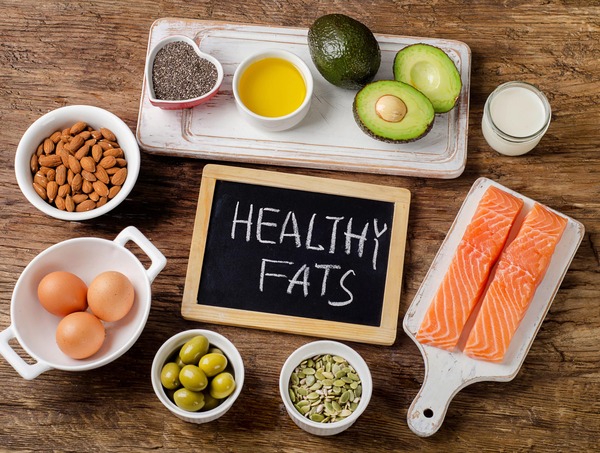Fats are often misunderstood, leading to confusion about their role in a healthy diet. To clarify, let’s break down the facts about fats, including their types, functions, and the best sources to incorporate into your diet.
Saturated Fats: Typically solid at room temperature, saturated fats are found in animal products like red meat, butter, and full-fat dairy, as well as some plant oils like coconut oil. While some saturated fat is acceptable, moderation is key, as excessive intake may increase the risk of heart disease.
Trans Fats: These are artificially created fats found in processed foods, often labeled as partially hydrogenated oils. Trans fats are harmful and should be avoided altogether, as they raise bad cholesterol (LDL) and lower good cholesterol (HDL).
Monounsaturated Fats: These fats are considered heart-healthy and are found in foods like olive oil, avocados, and nuts. They can help reduce bad cholesterol levels and provide essential nutrients.
Polyunsaturated Fats: This category includes omega-3 and omega-6 fatty acids, which are essential for brain function and cell growth. Sources include fatty fish (like salmon), walnuts, flaxseeds, and vegetable oils (like sunflower and corn oil).
Energy Source: Fats provide a concentrated source of energy, delivering more calories per gram than carbohydrates or proteins.
Nutrient Absorption: Fats help your body absorb fat-soluble vitamins (A, D, E, K), which are crucial for various bodily functions.
Cell Structure: Fats are essential for building cell membranes and play a role in hormone production.
Brain Health: Certain fats, especially omega-3 fatty acids, are vital for brain health and development.
To promote heart health and overall well-being, focus on incorporating healthy fats into your diet. Consider the following sources:
Avocados: Packed with monounsaturated fats, fiber, and vitamins.
Nuts and Seeds: Rich in healthy fats, protein, and fiber, making them a great snack option.
Olive Oil: A staple of the Mediterranean diet, olive oil is high in monounsaturated fats and antioxidants.
Fatty Fish: Salmon, mackerel, and sardines are excellent sources of omega-3 fatty acids.
Chia Seeds and Flaxseeds: Both are great plant sources of omega-3s and fiber.
Understanding the different types of fats and their roles in your diet is essential for making healthier food choices. Focus on incorporating healthy fats while minimizing saturated and avoiding trans fats. This balanced approach can contribute to better heart health and overall well-being. Always consult with healthcare professionals for personalized dietary advice tailored to your specific health needs.

When it comes to dietary fats, animal fat often gets a bad rap. But is animal fat really bad for you? Let’s delve into this topic to understand the benefits and risks associated with consuming animal fat, helping you make informed choices about your diet.
Animal fat is the fat derived from the tissues of animals. Common sources include beef, pork, lamb, and poultry. It can be found in various forms, such as lard (pig fat), tallow (beef fat), and chicken fat. Animal fats are primarily composed of saturated and monounsaturated fats, which can have different effects on health.
Animal fats are nutrient-dense, meaning they contain essential vitamins and nutrients. For instance, they are rich in fat-soluble vitamins like A, D, E, and K, which are crucial for various bodily functions, including immune support and bone health.
Fats are a concentrated source of energy. Animal fats provide more calories per gram than carbohydrates and proteins, making them an efficient energy source, especially for those on low-carb or ketogenic diets.
Animal fats add flavor and richness to meals. They can enhance the taste of dishes, making them more satisfying and enjoyable. This can lead to greater satiety, helping to curb overeating.
Animal fats have high smoke points, making them stable for cooking at high temperatures. This stability means they are less likely to produce harmful compounds when heated, compared to some vegetable oils.
Animal fat is high in saturated fat, which has been linked to increased cholesterol levels and heart disease. However, recent research suggests that the relationship is more complex, and not all saturated fats have the same effects on health.
The health effects of animal fat can depend on the source. Fats from grass-fed or pasture-raised animals may have a healthier fatty acid profile compared to those from conventionally raised animals, which may contain more unhealthy fats and hormones.
Consuming excessive amounts of animal fat can lead to an imbalance in your diet. It’s important to maintain a balance of fats, including healthy fats from plant sources like nuts, seeds, and avocados.
If you choose to include animal fat in your diet, consider the following tips:
Opt for Quality: Choose fats from high-quality sources, such as grass-fed beef or pasture-raised poultry.
Moderation is Key: Use animal fat in moderation, balancing it with other healthy fats and a variety of nutrient-rich foods.
Cooking Methods: Use animal fats for cooking at high temperatures or to enhance the flavor of dishes.
The answer to whether animal fat is good for you is nuanced. While it offers several benefits, including nutrient density and flavor, it’s important to consider the quality of the fat and maintain a balanced diet. As with many aspects of nutrition, moderation and variety are crucial.
Always consult with a healthcare professional or nutritionist if you have concerns about your diet or health. Understanding the role of animal fat can help you make informed choices that align with your dietary preferences and health goals.
animal tags: Animal-Fat
We created this article in conjunction with AI technology, then made sure it was fact-checked and edited by a Animals Top editor.